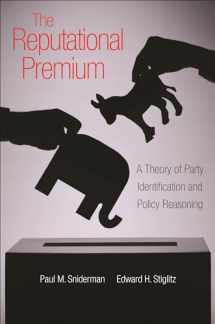
The Reputational Premium: A Theory of Party Identification and Policy Reasoning
Book details
Summary
Description
The Reputational Premium presents a new theory of party identification, the central concept in the study of voting. Challenging the traditional idea that voters identify with a political party out of blind emotional attachment, this pioneering book explains why party identification in contemporary American politics enables voters to make coherent policy choices.
Standard approaches to the study of policy-based voting hold that voters choose based on the policy positions of the two candidates competing for their support. This study demonstrates that candidates can get a premium in support from the policy reputations of their parties. In particular, Paul Sniderman and Edward Stiglitz present a theory of how partisans take account of the parties' policy reputations as a function of the competing candidates' policy positions.
A central implication of this theory of reputation-centered choices is that party identification gives candidates tremendous latitude in their policy positioning. Paradoxically, it is the party supporters who understand and are in synch with the ideological logic of the American party system who open the door to a polarized politics precisely by making the best-informed choices on offer.


We would LOVE it if you could help us and other readers by reviewing the book
Book review



